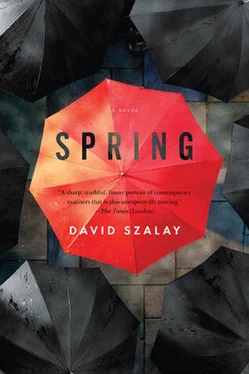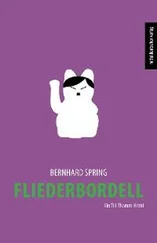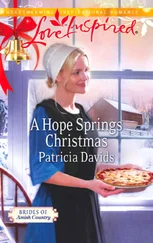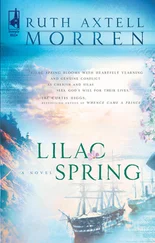She shrugged. ‘Don’t know,’ she said.
The question did not seem to interest her.
‘You’ve never thought about it?’
She shook her head. ‘No,’ she said.
They were on the train to Ghent. Outside the windows the Netherlandish banality of the landscape was mitigated by a frost so thick it looked like snow and sparkled in the flooding sunlight.
He said, ‘Am I just being sentimental?’
‘I don’t know. Maybe anthropo… whatever.’
‘What?’
‘Anthropocentric? Is that the word?’
There was something about the way she said, Is that the word? Without the slightest fear of seeming stupid or ignorant. She just knew she wasn’t stupid or ignorant. It was something that secretly impressed and intimidated him, which took him uneasily back to the times he used to sit with Miriam and her friends on his Islington terrace. In the presence of those men—and they were invariably men—James the estate agent would tend not to have much to say for himself, especially when the talk turned intellectual. And the talk was often oppressively intellectual when Miriam’s visitors were there, sitting on his terrace, with the faint odour of vegetation floating up from the water, supping his champagne. Magnus. Karlheinz. And Linhardt. Linhardt. He was the worst. That French twat, with his high forehead and serial killer’s blue eyes…
‘The famous are part of us,’ he is saying, when James steps onto the terrace with the second bottle of Veuve Clicquot, ‘of our identity. That is why they are so fascinating to us, why we feel strange when we see them, why we have even a sense of awe. You can say they are half-abstract beings, ideas, belonging to the world of the mind…’
‘Who’s your favourite celebrity?’ Miriam says.
Linhardt ignores her. ‘I make visible these ideas,’ he says, looking at James, ‘which I think is completely consistent with the definition of art…’
James nods, pours…
Linhardt. The thought of him still makes James want to kick something. Then, he took it out on the towpath—pounding it all the way to Victoria Park, under the low bridges, through the spaces laced with moving light when the sun was shining on the water.
Katherine’s lack of interest in the travails of little birds should not have surprised him. A week or so earlier, he had told her the story of the hatchling thrush—another one set on the terrace of his old Islington flat. One spring morning he had looked out through the French windows and seen a dead hatchling thrush on the decking. It must have fallen from a nest somewhere higher up. That in itself was sad, but what made it so memorably so—what in fact pierced him with a sorrow he has never been able to forget—was the way its parents spent the whole morning offering it worms. With worms in their beaks, its mother and father would frequently land next to it, where it lay lifelessly still on the decking, and wait there for a few moments, turning their heads in the way birds do, unable to understand why it wasn’t taking them.
She said, ‘Aaww.’
Though she was trying to sound sad, she didn’t. It was obvious, anyway, that she was not being pierced by a sorrow she would never be able to forget.
He was irritated that the story had flopped. He wondered, in his irritation, if this meant that she was just not a very nice person. Was she just not a very nice person? Was that it?
No, she was just not as sentimental as he was. He was sentimental. She made him feel sentimental.
The train pulled into Ghent station at noon. They had lunch, then walked to Sint Baaf’s cathedral to see van Eyck’s altarpiece. That was why they were in Ghent. That was what she wanted to see. One of the Masterpieces of Western Art. It was a strange image. In the middle, an important-looking sheep stood on a table with blood flowing in a neat stream from a hole in its front into a metal cup. The sheep did not seem to be in pain, or even to have noticed what was happening. There was a subtly painted suggestion, too, that it was shining with light. In the field around it were lots of expensively dressed people, mostly men, some with wings… Yes, it was very strange. He knew that the sheep was a symbol of Jesus Christ—he knew about the angels and saints. He was familiar with the iconography. What made it seem strange, and this was what she was explaining to him as they perambulated around the altarpiece in its perspex house, was the way it was painted. The familiar symbols of medieval art had been painted as if they were real things. That was what made them seem strange. The sheep looked like a real sheep, like a photo of a sheep. That was what was strange. And she drew his attention to the swallows or swifts flitting about in the luminous evening sky near some palm trees—very small, to indicate their distance from the spectator—and not one of them the same as the others, each painted in a specific position in flight, obviously observed from nature—one swooping, another soaring, another spiralling—escapees from a world of symbolic and stylised art.
When they had seen the masterpiece she said, ‘Should we get totally pissed?’ They were leaving Sint Baaf’s. It was not something he normally did. Pensively, he stroked his jaw. Then he said, ‘Yeah, okay,’ and they went and drank a lot of Duvel, and Westmalle Tripel, and Piraat, and Sint Bernardus Abt 12, with its laughing monk on the label. It was still just about light when they stumbled out into the Grote Markt several hours later, and presumably freezing though they were insensible to it now. Looking for the station, they quickly found themselves lost in the streets of a disappointingly twenty-first-century town—plastic trams, ATMs… A taxi… A stiflingly overheated Merc. When James addressed the driver in slurred French, the man answered in unfriendly English. The fare for the two-minute drive was €6. At the station, they struggled with the question of which platform to wait on. A well-insulated local told them to take the next train to Zeebrugge.
And Zeebrugge, very tediously, was where they woke up. They spent two whole minutes on the platform there in a knifelike wind that whipped in off the North Sea, then took another taxi—another overheated Merc—all the way to their hotel (the fare was €80), where they went straight upstairs and fell asleep.
The next morning, their final morning in Flanders, hungover and eating hot frites from a paper cone, she snuggled into him as they walked under the frozen copper-sulphate sky and said, ‘I feel nice with you.’ Things seemed okay then.
*
On Friday, towards the end of the afternoon, he takes Hugo for a walk. The St Bernard dislikes the subterranean flat. He usually spends the day lethargically filling the sofa, or when James is sitting on the sofa, the whole vestibule—a huge, sad-eyed harlequin.
Under the sky-scraping London planes of Russell Square, which are just starting to venture forth their leaves, James throws a tennis ball for him; and if he is throwing it with more than usual vigour it may be an effect of what she said to him on the phone as he walked to the square from Mecklenburgh Street. She said she was tired. She did not want to meet tonight. Someone was off sick, she said, and she had to work an extra-long shift. Then, perhaps hearing the disappointment in his voice, she said, ‘Let’s do something tomorrow.’
He perked up slightly, said he’d try to think of something special…
‘No,’ she said, ‘nothing special. Let’s just go to the cinema or something.’
He asked her what she wanted to see.
‘I don’t know. What is there?’
He said he’d have a look.
And then, just when that seemed settled, he said, ‘Are you sure you don’t want to do something tonight?’
Читать дальше












